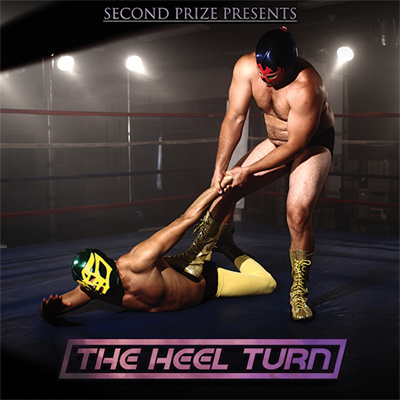Second Prize The Heel Turn Interview

Second Prize 'The Heel Turn' Album Out 22nd March
The new album from Melbourne band Second Prize takes its name from the world of Pro Wrestling. The Heel Turn is the moment when a good guy (or a "face") becomes a bad guy (or a "heel").
Many of the songs on the debut album inhabit that space – the grey area where male behaviour normally regarded as drifts over into toxic masculinity.
"At the moment I think we as a culture are engaged in this massive audit of masculinity – what do we keep; what do we chuck out?" says singer/ songwriter John Palmer. "When you look at a lot of the common topics in rock music, they're fine as far as they go, but you don't need to push them very far at all before you end up in wrongtown. I'm really interested in that dynamic."
He points to lead single Waiting for a Spark, which details a couple picking over their relationship, as an example. Other variations upon the theme include Sneak Around, which details an inept seduction attempt, and Try You On, which takes the cliché of a male narrator's erotic fixation on an item of his girlfriend's clothing to its logical conclusion.
Musically, the songs by turns evoke the sleazy disco of Pulp, the midlife- crisis scuzz-rock of Grinderman-era Nick Cave, and the hangoverweary tenderness of Lambchop and Sparklehorse.
Palmer was previously the frontman of Half A Cow signing The Raylenes, and has more recently played guitar for Melbourne indiepop auteur Georgia Fields. Chief collaborator Dave Rogers has played with Klinger, Ben Lee, Sophie Koh and Slow Fades.
The Heel Turn is released independently on March 22, and being launched on March 31 at The Workers Club with support from Magnets and Duke Batavia.
Interview with Second Prize
Question: How would you describe your music?
John Palmer: If I were feeling dramatic I would describe it as the sound of masculinity in crisis.
If I actually wanted to communicate useful information, I would say it sounds by turns like the sleazy disco of Pulp, the mid-life-crisis scuzz-rock of Grinderman-era Nick Cave, and the hangover-weary tenderness of Lambchop and Sparklehorse.
Question: What inspired The Heel Turn?
John Palmer: The album title emerged when we were looking back at the work, trying to figure out what linked all the songs together.
A lot of the songs on the album explore that moment – the queasy area where male behaviour normally regarded as acceptable drifts over into what I guess we call toxic masculinity.
Question: What should we expect from your upcoming show?
John Palmer: Duke Batavia slinging four part harmonies and ukulele-driven indo-pop.
Magnets delivering immaculate, sinister pop gems.
And me taking all of the swears out of my songs on the fly because (as I suspect, given it will be a Sunday matinee) the room is full of kids.
Question: Which is your favourite song to perform live and why?
John Palmer: "Back to the Cul-de-Sacs". It's this big, dramatic number about class anxiety and reckoning with your past and suburban swingers parties and it just keeps building and building until it explodes. Lyric video here.
Question: If you could have anyone, in the world, attend a show, who would it be?
John Palmer: I have debilitating crush at the moment on Alexandria Ocasio-Cortez, so her I guess. I probably lack the requisite grasp of public policy issues to win her over, but she's a demon on twitter so it would be good publicity.
Question: Do you prefer performing live or recording?
John Palmer: Performing live. Recording always reminds me of that quote (I think it was Virginia Woolf) that goes something like "it will never be so perfect as it is now: in my mind, unwritten". Recording is inevitably a series of tiny failures to live up to your vision. Performing on the other hand – that's fun.
Question: What is the story behind the band name?
John Palmer: One of my friend's workmates made him a little badge that said "Good Trier", which is such an awesome sledge. Second Prize is a similar idea but rolls off the tongue a little more easily.
Question: How did the band come together?
John Palmer: Dave was supposed to start a residency at a pub on Sydney Rd when he broke his arm playing basketball. His manager asked my band if we could fill the spot. Dave and his broken arm turned up to watch us play, asked me if I'd be the guitarist in his band.
Over the years he's introduced me to pretty much all the other wonderful musicians who contributed to this album and the live shows – Amy Bennett on keys and backing vocals, Glenn Arnup and Tim Reid on bass, and Dave Kleynjans on drums, to name the major contributors.
Question: What motivates you most when writing music?
John Palmer: It's like scratching an itch. I get the germ of a musical idea or a couple of lines of lyrics and I feel uncomfortable until I've got the whole thing out.
Question: Which music/artists are you currently listening to?
There are a few advance tracks live from the upcoming Lambchop album, This (is what I wanted to tell you), and they are fabulous.
Canyon Songs, by Melbourne band Slow Fades (which Dave is also in) is great.
And I don't think I've been a week without listening to His'n'Hers by Pulp or 1989 by Taylor Swift since they came out.
 Question: What or who was your inspiration to go into the music industry?
Question: What or who was your inspiration to go into the music industry? John Palmer: Growing up in New Zealand, the Flying Nun bands were huge for me, mostly because they weren't concerned about commercial success at all – they were just doing what they wanted to do. It took me years to realise that you could think about music any other way.
Question: If you could collaborate with another artist, who would it be?
John Palmer: My gut reaction is to say Neko Case, because she has a fascinating approach to song structure and arrangement, and a voice like a tidal wave. I think I could learn heaps from her. But then I've already collaborated a bunch with Georgia Fields, who also has a fascinating approach to song structure and arrangement, and a voice like a tidal wave. So maybe I've got that covered?
Question: What is the biggest challenge you have faced along the way to your musical success?
John Palmer: Time. There's never enough time.
Question: What's a typical day like?
John Palmer: Mostly it's people at work trying to engage me in conversations about Serious And Important Things while I half listen to them and write songs in my head.
Question: What has been your favourite part of becoming a music artist?
John Palmer: It sounds corny but the people I've met. I've worked in law firms and advertising agencies and NGOs and universities, but pound for pound the smartest, funniest, most creative people I've met have been the ones in rehearsal rooms and recording studios.
Question: Can you share your socials?
John Palmer: YouTube
Facebook.com/secondprizemusic/
@2ndprizetheband
@secondprizemusic/
Interview by Brooke Hunter
MORE





